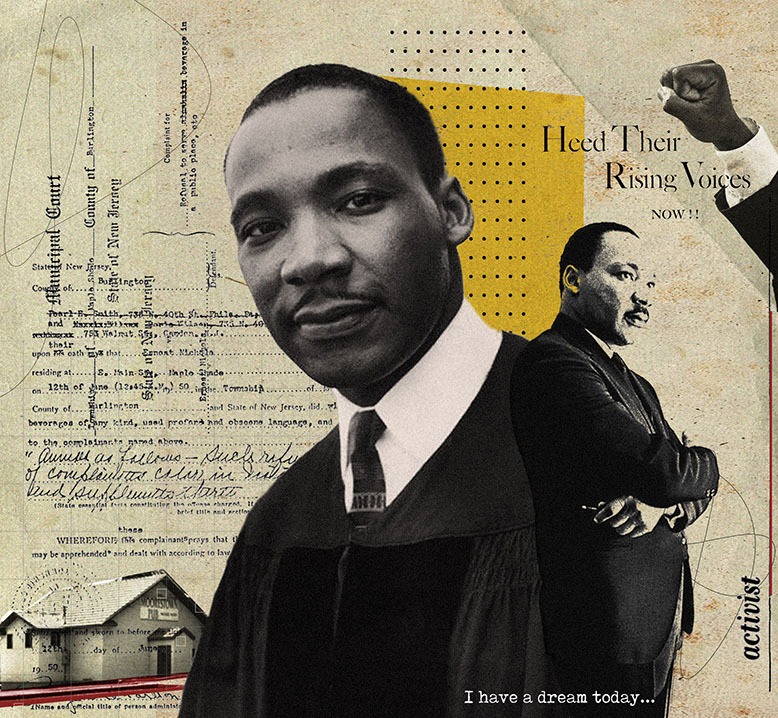
Illustration by Nadia Radic
Over seventy years ago, a little-known confrontation between the Rev. Dr. Martin Luther King Jr. and the gun-wielding owner of a modest Maple Shade tavern changed world history.
The incident sparked King’s resolve to dedicate his life to fighting racial injustice. It also marked his first-ever recorded civil rights sit-in.
“It is as important as the seed is to the plant or a spark to the fire,” says Patrick Duff, a community activist and watchdog journalist who is considered an expert on the sit-in. “It ignited his unwavering need to seek justice rather than seek peace. It was his first real taste of good trouble.”
Just 14 years later, moved by the teachings of pacifists like Mahatma Gandhi to adopt a non-violent approach to fighting injustice, poverty, and violence, he won the Nobel Peace Prize. But his initial drive to become an activist was sparked by the incident at Mary’s Café in Maple Shade.
The story began on Sunday, June 11, 1950. King, then 21 years old, had been ordained a Baptist minister two years earlier, but was continuing his formal studies at Crozer Theological Seminary in Chester, Pennsylvania. He split his time between Pennsylvania and a Camden duplex that he shared with his friend and Crozer classmate, Walter McCall.
King and McCall were on a Sunday-night drive with McCall’s girlfriend, Pearl Smith, and her roommate, Doris Wilson. After attending an evening church service in Merchantville, the foursome decided to stop at Mary’s Café for a round or two of beers.
They sat at a table and waited…and waited…and waited for service.
Finally, McCall stood up and headed to the bar, where he approached the café’s owner, Ernest Nichols, and requested packaged beer with four glasses. Nichols refused, saying he couldn’t sell them packaged beer because it was a Sunday. Nichols then refused McCall’s order for four glasses of beer, and then four ginger ales.
“The best thing would be for you to leave,” Nichols told him, according to a police report.
In response, the four remained glued to their seats—an act of non-violent protest later recognized as King’s first sit-in. By this time, it was past midnight.
Nichols then reportedly stomped out of the bar, later returning with a revolver and shooting it skyward just outside the tavern. “I’d kill for less,” Nichols shouted, now brandishing the gun, according to the police report.
The four friends, fearing for their lives, fled the café and made a beeline for the Maple Shade Police Department, where they filed a complaint. According to Duff’s research, at first the police department refused to file a report. The foursome then contacted Camden NAACP president Ulysses Wiggins to help them file the case, which he did successfully.
Nichols was charged with disorderly conduct and violation of New Jersey’s 1945 civil rights law prohibiting refusal of service based on race. In the end, Nichols was found guilty of firearms violations and fined $50. The racial discrimination case was dismissed.
Over the years, King spoke about the incident, saying it was “a formative step” in his “commitment to a more just society.”
The tavern was demolished in 2011, but a sign recalling the historic event and honoring King was installed in 2018 at the site where Maple Shade history and American history intersected.
No one knows New Jersey like we do. Sign up for one of our free newsletters here. Want a print magazine mailed to you? Purchase an issue from our online store.
